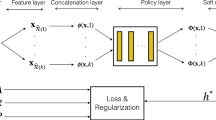Abstract
We study offline data poisoning attacks in contextual bandits, a class of reinforcement learning problems with important applications in online recommendation and adaptive medical treatment, among others. We provide a general attack framework based on convex optimization and show that by slightly manipulating rewards in the data, an attacker can force the bandit algorithm to pull a target arm for a target contextual vector. The target arm and target contextual vector are both chosen by the attacker. That is, the attacker can hijack the behavior of a contextual bandit. We also investigate the feasibility and the side effects of such attacks, and identify future directions for defense. Experiments on both synthetic and real-world data demonstrate the efficiency of the attack algorithm.
Access this chapter
Tax calculation will be finalised at checkout
Purchases are for personal use only
Similar content being viewed by others
Notes
- 1.
In this paper we restrict the poisoning to modifying rewards for ease of exposition. More generally, the attacker can add, remove, or modify both the rewards and the context vectors. Our optimization-based attack framework can be generalized to such stronger attacks, though the optimization could become combinatorial.
- 2.
The choice of norm is application dependent, see e.g., [15, Fig. 3]. Any norm works for the attack formulation.
- 3.
Even if some context \(x^*\) cannot be strongly attacked, the attacker might be able to weakly attack it. Weak attack is sufficient for the attacker to force an arm pull of \(a^*\). However, as \(\epsilon \rightarrow 0\) strong attack approaches weak attack. Thus we only need to characterize strong attacks.
- 4.
References
Abbasi-Yadkori, Y., Pál, D., Szepesvári, C.: Improved algorithms for linear stochastic bandits. In: Advances in Neural Information Processing Systems (NIPS), pp. 2312–2320 (2011)
Agarwal, A., et al.: Making contextual decisions with low technical debt (2016). coRR abs/1606.03966
Alfeld, S., Zhu, X., Barford, P.: Data poisoning attacks against autoregressive models. In: The 30th AAAI Conference on Artificial Intelligence (2016)
Auer, P., Cesa-Bianchi, N., Fischer, P.: Finite-time analysis of the multiarmed bandit problem. Mach. Learn. 47(2–3), 235–256 (2002)
Biggio, B., Nelson, B., Laskov, P.: Poisoning attacks against support vector machines. In: Proceedings of the 29th International Coference on International Conference on Machine Learning (ICML), pp. 1467–1474 (2012)
Chapelle, O., Manavoglu, E., Rosales, R.: Simple and scalable response prediction for display advertising. ACM Trans. Intell. Syst. Technol. 5(4), 61:1–61:34 (2014)
Goodfellow, I.J., Shlens, J., Szegedy, C.: Explaining and harnessing adversarial examples. In: International Conference on Learning Representations (2015)
Greenewald, K., Tewari, A., Murphy, S.A., Klasnja, P.V.: Action centered contextual bandits. In: Advances in Neural Information Processing Systems 30 (NIPS), pp. 5979–5987 (2017)
Jagielski, M., Oprea, A., Biggio, B., Liu, C., Nita-Rotaru, C., Li, B.: Manipulating machine learning: poisoning attacks and countermeasures for regression learning. arXiv preprint arXiv:1804.00308 (2018)
Joseph, A.D., Nelson, B., Rubinstein, B.I.P., Tygar, J.: Adversarial Machine Learning. Cambridge University Press, Cambridge (2018)
Kuleshov, V., Precup, D.: Algorithms for multi-armed bandit problems (2014). coRR abs/1402.6028
Li, B., Wang, Y., Singh, A., Vorobeychik, Y.: Data poisoning attacks on factorization-based collaborative filtering. In: Advances in Neural Information Processing Systems, pp. 1885–1893 (2016)
Li, L., Chu, W., Langford, J., Schapire, R.E.: A contextual-bandit approach to personalized news article recommendation. In: Proceedings of the 19th International Conference on World Wide Web (WWW), pp. 661–670 (2010)
Mei, S., Zhu, X.: The security of latent Dirichlet allocation. In: The 18th International Conference on Artificial Intelligence and Statistics (AISTATS) (2015)
Mei, S., Zhu, X.: Using machine teaching to identify optimal training-set attacks on machine learners. In: The 29th AAAI Conference on Artificial Intelligence (2015)
Ng, A.Y., Harada, D., Russell, S.J.: Policy invariance under reward transformations: theory and application to reward shaping. In: Proceedings of the 16th International Conference on Machine Learning (ICML), pp. 278–287 (1999)
Zhao, M., An, B., Yu, Y., Liu, S., Pan, S.J.: Data poisoning attacks on multi-task relationship learning. In: Proceedings of the 32nd AAAI Conference on Artificial Intelligence, pp. 2628–2635 (2018)
Zhu, X.: Machine teaching: an inverse problem to machine learning and an approach toward optimal education. In: The 29th AAAI Conference on Artificial Intelligence (AAAI “Blue Sky” Senior Member Presentation Track) (2015)
Zhu, X., Singla, A., Zilles, S., Rafferty, A.N.: An overview of machine teaching. arXiv e-prints, January 2018. https://arxiv.org/abs/1801.05927
Acknowledgment
This work is supported in part by NSF 1545481, 1704117, 1623605, 1561512, and the MADLab AF Center of Excellence FA9550-18-1-0166.
Author information
Authors and Affiliations
Corresponding author
Editor information
Editors and Affiliations
Rights and permissions
Copyright information
© 2018 Springer Nature Switzerland AG
About this paper
Cite this paper
Ma, Y., Jun, KS., Li, L., Zhu, X. (2018). Data Poisoning Attacks in Contextual Bandits. In: Bushnell, L., Poovendran, R., Başar, T. (eds) Decision and Game Theory for Security. GameSec 2018. Lecture Notes in Computer Science(), vol 11199. Springer, Cham. https://doi.org/10.1007/978-3-030-01554-1_11
Download citation
DOI: https://doi.org/10.1007/978-3-030-01554-1_11
Published:
Publisher Name: Springer, Cham
Print ISBN: 978-3-030-01553-4
Online ISBN: 978-3-030-01554-1
eBook Packages: Computer ScienceComputer Science (R0)




